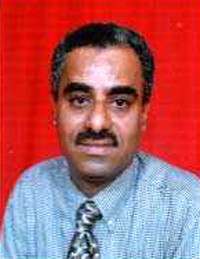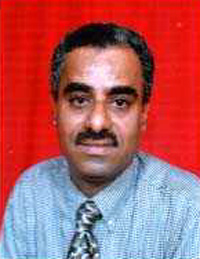
Aden University’s Stance on Investors [Archives:2000/30/Interview]
July 24 2000

Aden Office
University education is no longer a luxury or a gateway for only obtaining degrees which qualify a university student as an educated person. What is more significant is the thoughts, dreams, visions and capabilities an alumnus carries go in harmony with developments and how he embraces modern transformations. But, unfortunately he is embittered by the want of the investors’ role in his pre-and-post graduation life.
In this context, Ridhwan Al-Saqqaf of Yemen Times, Aden Bureau Chief, met Dr.Saleh Ali Bassurah, Rector of Aden University and discussed with him many issues relevant to the University. Excerpts.
Q: Anything new inside and outside your University?
A: I have a lot to say; but in brief Aden University has witnessed many a development such as:-
a) Finishing the construction and furnishing of Law Faculty in the new University City, Aden, at a cost of around one billion and 200 million Riyals. The cost of furniture alone amounted to $1 million.
b) Completion of four boarding houses to accommodate more than 1,200 students, a building for students’ activities and another complex for administration of students housing affairs’. The units have been constructed at the University City site.
c) Construction of a guest house which had been opened in February this year.
d) Expansions in most faculties buildings such as re-building of Siber Faculty of Education, Lahj Governorate. Most of its buildings were damaged during the 1994 war. Four halls, each accommodating more than 100 students and a stadium for 350 students have been added to it.
e) Refurbishing buildings of Aden Education faculty in addition to buildings which can accommodate more than400 persons. A second story has been added to the Library. These works were funded by both the World Bank and the Government at an estimated cost of about $ 2.5 million.
f) Four laboratories, lecture halls and administration offices were built in the Faculty of Agriculture.
g) Work is going ahead for the completion of president Ali Abdulla Saleh Hall at the Faculty of Oil & Minerals in Shabwah Governorate at a cost of YR 50 million.
h) Refurbishing the building of the what was formerly known as the Scientific Socialism Institute, to be used by the Faculty of Arts.
I) Refurbishing building of the formerly headquarters of the central committee of the Socialist Party to be used as head offices of the university and scientific centers. The building was previously a structure without windows or furniture.
j) Increase in higher studies programs at the University from three in 1991 to 23 in 1999.
k) Increase in number of faculties from eight in 1990 to 16 in 1999.
l) Increase in number of scientific majors for bachelor’s degree from 43 in 1990 to 80 in 1989. The faculties in which majors were introduced at the University were: pharmaceutics, dentistry, computer engineering, architecture, telecommunications engineering, media & press, psychology, Islamic Education, Physical Education, oil economics and geology.
m) Inauguration of affiliation program for scientific studies in the UAE and Jordan. Our University professors travel to these states on the basis of intensified-course system.
n) Compiling and printing more than 60 University books, references and documents during the past four years.
o) Issuing three regular scientific magazines: embodying research in Social & Human Sciences and Natural & Applied Sciences.
p) Founding of the “Aden University Prize” in order to encourage scientific researches in basic sciences. On the occasion of 25th anniversary of foundation on September 10, 2000, names of winners will be announced. More than 40 professors and researchers from various universities and other scientific institutions in Yemen have contested for this prize.
q) Founding nine scientific centers during the period 1995-1999. Some are meant for coordination and organization of research activities at the University while others are meant for offering services to the society against fees.
r) Numerous scientific symposia have been held. Preparations are underway for the convention of an international symposium on: “Trends and Horizons of Higher Education in the 21st Century”. Another symposium shall be convened on “Evaluation of the Academic Activities of University of Aden During 1995-2000 and to draw up a working plan for the coming five years: 2001-2005.”
Q: What kind of support does the State offer to the university?
A: The State has been offering significant financial aid to the University. In 1990, the University budget was around YR.123 million and the ratio of investment spending was hardly 1% equalling YR.1,279,000. In 1998, the budget soared up to about two billion and 112 million riyals and investment spending was 45%. The State also allotted a plot of land of 400hectare for the construction of the University City in addition to assisting the teaching staff and consequently improved the living condition of the teaching staff among these of all universities of Yemen.
Q: What further investments are needed in education field?
A: There are many areas of investment in higher education, but most important among them are:-
a) A law regulating higher education, governing the establishment of private universities and decrease the number of conditions upon which to grant them permission. There should be measures of supervising quality of higher education in them.
b) A national policy should be set up by the state on students’ admission to the university taking into account needs of the labor market.
c) Government universities should be granted financial and administrative independence as well as offer opportunities for scientific investment. This would reduce their financial dependence on the state budget.
d) There are plans to introduce a partnership system between the universities and private enterprises, in the field of training, qualification, submission of studies and inventions for the development of entrepreneurial activities and marketing their products.
e) Establishment of a mixed sector institution for appraising outputs of higher education in Yemen and consequently defining the scientific level of each specialty at every university.
f) To allocate a reasonable percentage from the national income (taxes, oil revenues etc.) to finance scientific research and higher education mainly in the field of organizing workshops, equip laboratories and finance researches, and develop them and feed them with latest know-how.
g) To establish a national information network inter-linking scientific institutions in Yemen and to link Yemen with Arab and international information networks.
h) To reduce number of dispatching students on scholarships abroad for university or higher studies and transfer a part of their expenses towards development of government universities, especially dealing with higher studies.
These are the most important requirements which need investment in the field of higher education and scientific research. Some of these are being accomplished on priority. We need a financial-legal-administrative push to bring a qualitative change in this field. The outcome shall lead to a genuine qualitative transformation in the development of our country.
Q: The number of students increases every year. How do you cope with this?
A: Secondary graduates exceed the capacity of Yemeni universities. The education pyramid here is upside-down, i.e. a large number of secondary schools with fewer technical and vocational institutes. Secondary schools graduates’ level is weak. In Aden University we try to reduce the pressure of large number of students who want to join the University by holding entrance examinations; but despite this we accept larger numbers of students than our capacity. According to the last three years’ statistics, the number of male and female applicants annually reached about 10,000. We admit 6000-7000. This figure declines by 20% when the first year examinations are held.
Applied sciences faculties, human medicine, pharmaceutics, dentistry, computer engineering and architecture on one hand and specialization in English language, accounting, office management and Islamic Teachings are in greater demand. The problem is that applied sciences cannot accept large numbers of students owing to scarcity of workshops and labs. Clinic work in major of medicine is also limited.
I repeat that we need a national policy for enrollment. We need more accent on intermediate and advanced technical and vocational education.
Q: May you please give us an idea about higher studies and other studies in the University?
A: We have a program for higher studies diploma or master’s degree. In the Faculty of Medicine & Health Sciences we have four programs: pediatrics, gynecology, general health and pathology.
In the Faculty of Agriculture we have two programs: plants supervision and botany. In the Faculty of Education we have syllabi, teaching methodology and educational administration. In the Faculty of Arts we have history, geography, sociology, English and French languages and philosophy. In the Faculty of Law we have the criminal and civil codes. In the Faculty of Economy we have office management.
We are considering to open doctorate programs in the majors where four to five groups of graduates have already qualified as MA.
We have programs for joint supervision in the field of higher studies in collaboration with some Arab and foreign universities such as Damascus University, Baghdad University, Sourborne University, Liverpool University, Leipzig University, Hamburg University and the Central Institute of English and Foreign Languages, Hyderabad.
Q: What are aspects of cooperation between you and other Arab and foreign universities?
A: We have scientific and cultural relations with more than sixty Arab and foreign universities and regional and international scientific organizations and institutions. Aden University is a member of the Arab Universities’ Federation, Islamic Universities Federation and the International Federation of Universities.
Q: Any final comment you would like to give
A: We all realize honestly that tasks of the present are much more than that of the past. The challenges of the future are greater compared to today’s challenges. It is my earnest desire to see everybody right from the ruler down to the opposition to be keen on the interests of the homeland including political pluralism, freedom of press and peaceful transfer of power.
And, finally, my sincere thanks go to the “Yemen Times”…..an exemplary model of modern journalism. Its advanced technology is admirable. I should not fail to point out that the “Yemen Times” has proved to be very helpful in communicating Yemen news and views abroad.
——
[archive-e:30-v:2000-y:2000-d:2000-07-24-p:./2000/iss30/intrview.htm]


